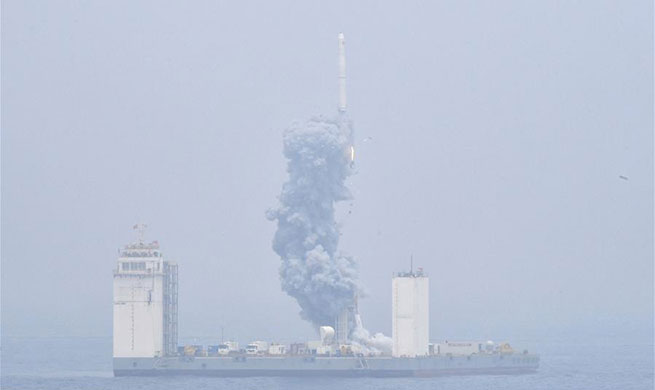by Marwa Yahya
CAIRO, June 5 (Xinhua) -- Mecca has held three summits during the last days of the Muslims holy month of Ramadan where the Arab leaders unanimously supported the commitment to the Palestinian issue.
Some Egyptian experts think that the decisions of Mecca summits will impact the announcement of U.S. peace plan, also known as the "Deal of the Century."
The summits reaffirmed the positions taken at the Arab League Summit held in Saudi Arabia's eastern city of Dhahran in 2018, which rejected steps taken by the U.S. President Trump's administration, including recognizing Jerusalem as Israeli capital.
During the summits, the Islamic countries' leaders reiterated the long-held position about the establishment of an independent Palestinian state with East Jerusalem as its capital.
They also reaffirmed that the Arab Peace Initiative is the only way to achieve a comprehensive solution to the conflict.
Only Palestinian President Mahmoud Abbas made direct reference to the "Deal of the Century," saying that the Palestinians would not join the U.S.-led conference in Manama, Bahrain, scheduled on June 25-26.
In parallel to Mecca summits, Jared Kushner, Trump's senior advisor, and Jason Greenblatt, the U.S. Middle East envoy, were in Jerusalem meeting with Israeli Prime Minister Benjamin Netanyahu to discuss Trump's peace plan.
The announcement of the plan has been delayed for several times because of the Middle East's ongoing disputes, Samir Ghatas, chairman of the Cairo-based Middle East Forum for Political and Strategic Studies, told Xinhua.
The full details of the deal might be revealed after the formation of the next Israeli government in October, the expert added.
Ghatas predicted that issues, such as the recognition of Jerusalem as Israel's capital, settling the issue of the Palestinian refugees, and withdrawal of the UN Relief and Works Agency for Palestine Refugees in the Near East (UNRWA), might be the main pillars of the deal.
But he added that the Arab's main players, including Saudi Arabia, Jordan, Egypt and Palestine, "constitute barrier for concluding the deal."
"Mecca summits' resolutions will force the U.S. administration to review its peace plan before Manama's meeting, which was based on deferred economic solutions that require huge funds," Ghatas explained.
He added that Trump's administration will also adjust some items of the plan until Netanyahu admits all the Israeli settlements on the Palestinian territories to satisfy the right wing to avoid dismantle of his future government.
He ruled out the possibility that "the Palestinian side will turn to flexibility concerning the U.S. deal," adding that changing the current political scene might need strong and unexpected steps.
After the conclusion of Mecca summits, the Arab countries are still showing skepticism towards the "Deal of the Century."
On Sunday, Egyptian President Abdel Fattah al-Sisi said that his country would not accept anything undesired by the Palestinians, referring to the U.S. peace plan.
The president also dismissed suggestions that Egypt might make concessions as part of the U.S. plan.
Mokhtar Gobashy, chairman of the Cairo-based center for political studies, agrees that "Mecca summits have dropped any legitimacy for the U.S.-Israeli measures concerning Jerusalem and the Israeli-occupied Golan Heights."
He argued that Mecca summits came at a difficult time for Palestine and the Palestinians.
"The Trump's administration is working overtime to deliver wins for Israel which it could only have dreamed of securing over several years, if not decades," Gobashy said.
The Arab summits have been always rejected any solution that fail to include the establishment of a Palestinian state, he said.
Theoretically, Mecca summits' decisions mean the rejection of the U.S. deal from Arab and Islamic countries, he added.
However, Gobashy expressed his concerns that "the issue is more about the ability of the Arab countries to push for the establishment of a Palestinian state on ground, which seems difficult."
He added that Israel will never accept the establishment of Palestinian state unless the U.S. administration gave pressure on that path.
"The U.S. should realize that its interests in the region are at stake," the expert said.
He suggested that the Arab countries could stop the arm deals coming from the United States, reduce the diplomatic level and recall some ambassadors as practical moves to press Trump's administration to force Israel to accept the establishment of Palestinian state.
"The Gulf countries have more than 2 trillion U.S. dollars of investments in America in addition to several billions dollars on arm deals, which can be reduced as a message of rejection of the U.S. peace deal," he said.
















